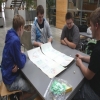A hotel will be built from the ground up. The roles are distributed. A student's hotel director, another head waiter, a third chef and so on. Each student draws a card that describes a realistic problem, the student must solve, or an event, the student must relate to. There must be organized a staff meeting, an employee has slipped on the wet floor, or have taken the box for example. The game is in progress. Quality Patrol is visiting the Academia Hans Berg in Kolding, where Linda Sass Meyer, who teaches entrance "Food for People", tells of the department, while she draws one game after another out of the bag. Role play to start a hotel and a pile of plastic laminated A4 sheet with cords for an orienteering. Here it names the game, and which courts typically can be prepared from them. A game of Monopoly, where all questions are about the pig. Can not you answer correctly on the map questions, one must move back on the board. "So I am not travelers in the joke," asserts Linda Sass Meyer. "But I find that students learn faster and remember better when they play their way through the technical concepts. We train basic knowledge, and I find that the students really make an effort. At the same time, I think it's important that they get a certain amount of knowledge at your fingertips without having to look up in books or Google concepts. The combination of competition, fun and to be pressed a little, I can see, is very motivating. "Linda Sass Meyer is bitten by developing games. "It's something everyone can. Look at a game that already exists, and swap so the issues out with academic subjects. Once you start, there are many possibilities. "
Combining professionalism and pedagogy
The development of games for teaching took off when school sparked the broader health perspective, a project that combines health, professionalism and pedagogy. With the game it was obvious to combine the three elements in a fun and not least meaningful way. Once a year, each team at the school asked to describe their best pedagogic idea, after teachers vote on what they want to hear more about. "At a seminar over two days presenting teachers so that their ideas for each other. It has for us been a simple and good way to share knowledge, "says Training Manager Gitte Lykke Farm. Here Linda Sass Meyers games helped to inspire other team. The hairdressers are doing, for example, power breaks, where they must quickly stand up on a variety of after hair tone.
We forget that we learn
One of the students are happy to play, Andreas Lauritsen, apprentice chef at Hotel Propellen in Billund. "I'm not a big skolegænger, and it's not easy for me to get things to stick by reading a book or hear the teacher tell. If I have to learn, I make things, and it's not easy to make theory. But if I use the body at the same time, I can learn what I need. And when playing in the hours, you forget that you learn. When we played repetition-rounders, where to correctly answer a research question, before you can turn on or volleyball, where the point only applies if you can answer a question correctly, we forget both that we learn and that we get exercise. We are just having fun, "says Andreas Lauritsen.
Facts about Quality Patrol
Quality Patrol visiting all the country's vocational schools for the period 2010-2012 for the dissemination of knowledge and experience and inspire schools to share knowledge across. The goal is to create better business education. Quality Patrol is created as part of efforts to strengthen vocational education reputation and is part of the Agreement on multi-year agreement for the tertiary education in the period 2010-2012 between the government, the Social Democrats, the Danish People's Party and Social Liberals.
Source: UVM.dk 


